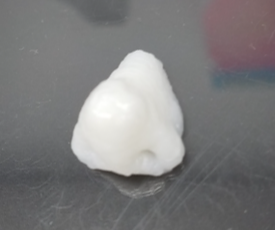TissueFab® bioink Bone Vis/405 nm, low endotoxin is intended to stimulate osteogenic differentiation of stem cells. It is based on a hydrogel system of gelatin methacryloyl (GelMA) and hydroxyapatite (HAp). Calcium phosphate in a highly crystalline state is known as HAp. Since HAp is chemically identical to the mineralized phase of bone, it possesses high biocompatibility as well as osteoinductive and osteoconductive qualities that promote bone regeneration.
Hydrogels containing HAp have been researched to determine how they can be processed using various additive manufacturing techniques. Printing cell-filled structures using bioink formulations incorporating HAp has demonstrated better osteogenic characteristics.

Image Credit: Merck
Properties
Source: Merck
| . |
. |
| Form |
Viscous liquid |
| Quality Level |
100 |
| Impurities |
≤5 CFU/g Bioburden (Total Aerobic)
≤5 CFU/g Bioburden (fungal)
<50 EU/mL Endotoxin |
| Color |
White |
| pH |
6.5-7.5 |
| Viscosity |
5-50 cP(37 °C) |
| Application(s) |
3D bioprinting |
| Storage temp. |
2-8 °C |
Application
A ready-to-use bioink called TissueFab® Bone Vis/405 nm, low endotoxin is intended for extrusion-based 3D bioprinting and subsequent crosslinking with exposure to 405 nm visible light.
It is developed for excellent cell survival, osteoinduction, and printing fidelity. GelMA-Bone bioinks are biodegradable, and compatible with human mesenchymal stem cells (hMSCs), and osteogenic cell types. They can be utilized with the majority of extrusion-based bioprinters.
The accurate creation of osteogenic 3D cell models and tissue constructions for study in 3D cell biology, tissue engineering, in vitro tissue models, and regenerative medicine is made possible by TissueFab® bioink Bone Vis/405 nm, low endotoxin.